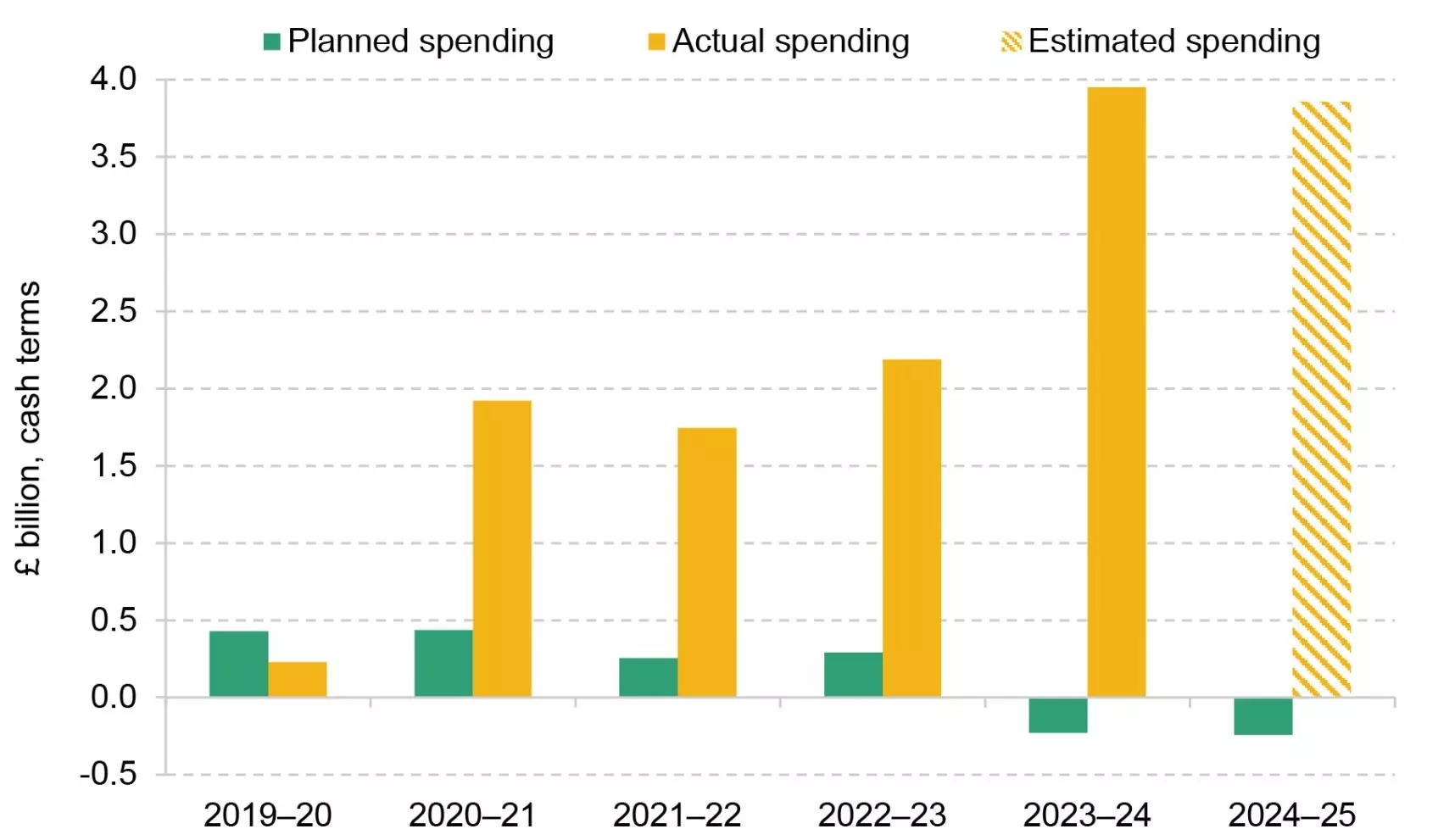An independent think tank has criticised the Home Office for its recent "bad habit" of submitting annual spending estimates to parliament that the department "knew would be insufficient".
In an analysis published today, the Institute for Fiscal Studies said that between 2021-22 and 2023-24, the Home Office planned to spend a net total of £320m on asylum, border, visa and passport operations – but ended up spending £7.6bn more than budgeted.
The think tank called for an end to the department's "deeply unsatisfactory" recent practice of setting out "unrealistically low" main estimates to parliament at the start of every financial year, and then getting the Treasury to top them up via supplementary estimates towards the end of the year.
Analysis authors Max Warner and Ben Zaranko said the practice of using reserve funding – supposedly set aside for "unforeseen, unaffordable and unavoidable" expenditure – may be a breach of Treasury rules.
They added that the budgeting behaviour accounted for at least part of the £22bn financial "black hole" that new chancellor Rachel Reeves told MPs officials had uncovered last month.
"The Home Office has got into the bad habit of each year submitting main estimates to parliament that it knew would be insufficient, relying on a top-up from the Treasury reserve later in the year," Warner and Zaranko said.
"Despite repeated reprimands from the Home Affairs Committee, and the fact that this behaviour seemingly contravenes Treasury guidance, it has been the practice of the past few years."
A parliamentary briefing on departmental main estimates published in July noted that the Home Office's latest main estimate acknowledged that its projected £1.5bn expenditure on expected pressures in the asylum system would not be adequate.
Warner and Zaranko said that part of the new chancellor's £22bn black hole reflected funding requirements the Home Office had not included in its main estimate, but which it expected to get.
"When Rachel Reeves pointed to a £6.4bn in-year spending pressure on the asylum system, she was in effect pre-recognising the top-up that the Home Office was banking on receiving later in the year," they said. "The problem is that this time around, with major spending pressures elsewhere, there does not seem to be enough left in the reserve for such a top-up."
Former chancellor Jeremy Hunt reacted angrily to Reeves's 29 July financial update. He argued that the figures were directly at odds with the main estimates published earlier in the month and risked bringing senior civil servants "into disrepute" if they had signed off on plans they knew to be wrong.
Warner and Zaranko said Reeves was right to flag a genuinely big in-year asylum spending pressure that had not been budgeted for, although they said she may have overstated "the extent to which this was unforeseeable and unexpected".
They said Hunt was right to say the asylum funding pressures cited by Reeves seemingly contradicted the main estimates put before parliament. But they added the situation was "only because the Home Office and HM Treasury are continuing the poor budgeting practice of recent years, including the period when Mr Hunt was chancellor".
 Change between planned and actual Home Office day-to-day net spending on asylum, border, visa and passport operations. Source: IFS
Change between planned and actual Home Office day-to-day net spending on asylum, border, visa and passport operations. Source: IFS
IFS research economist Warner and senior research economist Zaranko said that while overspends were an entirely understandable and defensible response to unexpected spikes in cost, the Home Office's current behaviour was "clearly not a sensible way to plan public spending".
"One obvious solution for the upcoming spending review would be to set higher initial budgets, based on the experience of previous years, to recognise up front the likely amount of asylum spending," they said.
"If the Home Office is budgeting a smaller amount than in the previous year, this should come with a plausible explanation for why demand and/or spending would fall so quickly. The reserve should be left for genuine emergencies, not spending that the government expects to do but does not want to budget for."
They said an alternative approach would be to classify asylum spending as "annualy managed expenditure", a category of spending designed for things – such as welfare benefits – that are hard to budget for and control.
However, Warner and Zaranko warned that such an approach might reduce the Home Office's incentives to keep asylum spending under control.
Gideon Rabinowitz, of the non-governmental organisation network Bond, said the IFS report highlighted an area of ongoing concern to the group.
"The Home Office has mismanaged its asylum spending over recent years," he said. "Providing support to refugees and asylum seekers is vital, but the current budget mismanagement reflects poor financial oversight and value for money.
"We’re concerned that this will further strain the already squeezed UK aid budget, leading to more cuts that harm the most marginalised people living in poverty and on the frontlines of global humanitarian and climate crises."
A Home Office spokesperson said the government was "determined to restore order to the asylum system" so that it operates swiftly, fairly and in the interest of taxpayers.
"We have been clear the prior approach was to fund the majority of asylum system costs through the supplementary estimate," they said. "As part of the ongoing spending review, in future we are seeking to include these costs in the main estimate."
The spokesperson added that scrapping the last government's "costly" plans to ship some categories of asylum seeker to Rwanda for resettlement and processing was part of the new approach.
Other measures include cutting down on the asylum backlog and reducing the use of expensive hotels to accommodate people seeking the right to stay in the UK.